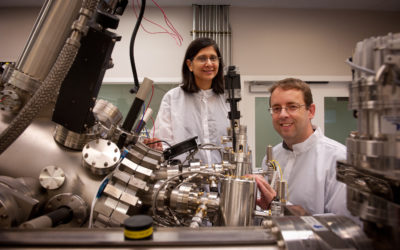John Muth

Biography
John F. Muth is a Distinguished Professor of Electrical and Computer Engineering at North Carolina State University where he has served on the faculty since 1998. He received a BS in Applied Engineering Physics from Cornell University in 1988. Upon graduating he served as a submarine officer on fast attack nuclear submarines from 1988 to 1993. He received a PhD in condensed matter physics at North Carolina State University in 1998. His thesis specialized in wide bandgap semiconductors and photonic devices. He specializes in the optoelectronic properties and materials and the fabrication of novel devices, making contributions to the advancement of wide bandgap and ultra-wide bandgap materials used in LEDs, Lasers, RF and power electronics, including the development of transparent thin film transistors used in cell phone displays. He has made contributions to sensors, wearable electronics, and underwater optical communications. In addition to submarine service, in 2008-2009 he was called back to active duty to serve in Iraq where he led a team embedded in embedded in the Iraqi Ministry of Interior, working with the senior Iraqi leadership on issues related to security and the rule of law. Since then he has:
- Co-Founded the NSF Engineering Research Center ASSIST on low power wearable electronics.
- Led the Start-up of and Principal Investigator for PowerAmerica, a National Manufacturing Institute focused on the development of Wide Bandgap Semiconductor Power Electronics
- Directed the NCSU Nanofabrication Facility
- Served as Jefferson Science Fellow (sponsored by the NAE) with USAID advising on technical issues with USAID and the State Department.
- Been actively involved with the Research Triangle Entrepreneurial Ecosystem, helping small companies get off the ground via the SBIR, STTR programs as well as cooperative research agreements. As a professor, he has helped several sets of student spin out small companies.
In the classroom Professor Muth has taught a variety of nanoelectronics, photonics and product innovation courses. He mentors the underwater robotics club which competes in national competitions.
He has over 200 publications, 11 patents and has received a variety of academic awards and military medals including a Bronze Star for meritorious service in Iraq.
Education
-
Ph.D.
1998
Solid State Physics
North Carolina State University, Raleigh -
Bachelor's
1988
Applied Engineering Physics
Cornell University, Ithaca
Research Focus
Recent Publications
- GaN-based tunnel junction with negative differential resistance by metalorganic chemical vapor deposition (2024)
- Growth and characterization of AlInN/GaN superlattices (2024)
- A Modular Endoscopic Tool and Laser Ablation Test-Bed for Studying Biological Tissue Ablation Control Strategies (2023)
- Designing and Testing a Closed-Loop Magnetically Actuated Laser Scanning System for Tissue Ablation (2021)
- Erratum: "Phonon-boundary scattering and thermal transport in AlxGa1
- xN: Effect of layer thickness" [Appl. Phys. Lett.117 , 252102 (2020)] (2021) - Dielectric and conducting properties of unintentionally and Sn-doped beta-Ga2O3 studied by terahertz spectroscopy (2020)
- Phonon-boundary scattering and thermal transport in AlxGa1-xN: Effect of layer thickness (2020)
- Effect of Growth Pressure on PLD-Deposited Gallium Oxide Thin Films for Deep-UV Photodetectors (2019)
- Self-Heating Characterization of $\beta$ -Ga2O3 Thin-Channel MOSFETs by Pulsed ${I}$ - ${V}$ and Raman Nanothermography (2019)
- Thermal conductivity of ultra-wide bandgap thin layers - High Al-content AlGaN and beta-Ga2O3 (2019)
Highlighted Awards
Awards & Honors
- 2009 - United States Armed Forces Bronze Star Medal
- 2006 - Joint Services Humanitarian Service Medal (Hurricane Katrina)
- 2004 - National Academy of Engineers Frontiers of Science Award
- 2003 - Office of Naval Research Young Investigator Award
- 2002 - Oak Ridge Ralph E Powe Award
- 2000 - Discovery Magazine Technology Award, Top 10 Finalist
- Various Military awards include Navy Commendation Medal, (2) Navy Achievement Medals (2), Expeditionary Medal, Arctic Service Ribbon, etc.
Recent News
NC State to Lead Regional Semiconductor Innovation Hub
Posted on October 4, 2023 | Filed Under: News
NC State will use its engineering prowess to help shape domestic production of wide bandgap semiconductors.

Wolfspeed Ahead: An NC State Spinoff Powers the Future
Posted on October 24, 2022 | Filed Under: News and Research
The company that pioneered LED lighting now looks to improve the efficiency and performance of electric vehicles and other high-power applications. Meet the people building the world’s largest silicon carbide manufacturing facility in Chath …

John Muth Receives Outstanding Research Award from NC State
Posted on March 18, 2022 | Filed Under: Awards and Quantum
Congratulations to ECE Professor, John Muth, for receiving the 2022 Outstanding Research Award.
Media Mentions

Deputy Secretary of Defense Kathleen Hicks Announces $238M CHIPS and Science Act Award
September 20, 2023
Deputy Secretary of Defense Kathleen Hicks announced the award today of $238 million in “Creating Helpful Incentives to Produce Semiconductors (CHIPS) and Science Act” funding for the establishment of eight Microelectronics Commons (Commons) regional innovation hubs. This includes the Commercial Leap Ahead for Wide Bandgap Semiconductors (CLAWS) Hub, led by NC State University with a $39.4-million award for FY23.

“A game changer”: With CHIPS Act, NC is poised for a new manufacturing boom
October 13, 2022
The new law includes $13.2 billion for research and the training of people to work in the development, design and manufacturing of semiconductor wafers and the chips that are built on them. The R&D funding could be a boon to North Carolina’s research universities, especially N.C. State. John Muth, a professor of Electrical and Computer Engineering at North Carolina State University, said other states dominate in the design and production of silicon-based chips, but N.C. State is at the forefront of developing a new generation of silicon carbide semiconductors that can endure higher temperatures and higher voltages, qualities that will be increasingly needed in electric automobiles, data processing centers and clean energy production. “In general, we need to do more manufacturing, do it cleaner and employ people with better paying jobs and the CHIPS Act helps out with that,” he said.

3D-Printing Liquid Metal Could Make the T-1000 Terminator a Reality
July 16, 2013
NC State researchers have developed three-dimensional (3-D) printing technology and techniques to create free-standing structures made of liquid metal at room temperature. John Muth, electrical and computer engineering, uncredited.
